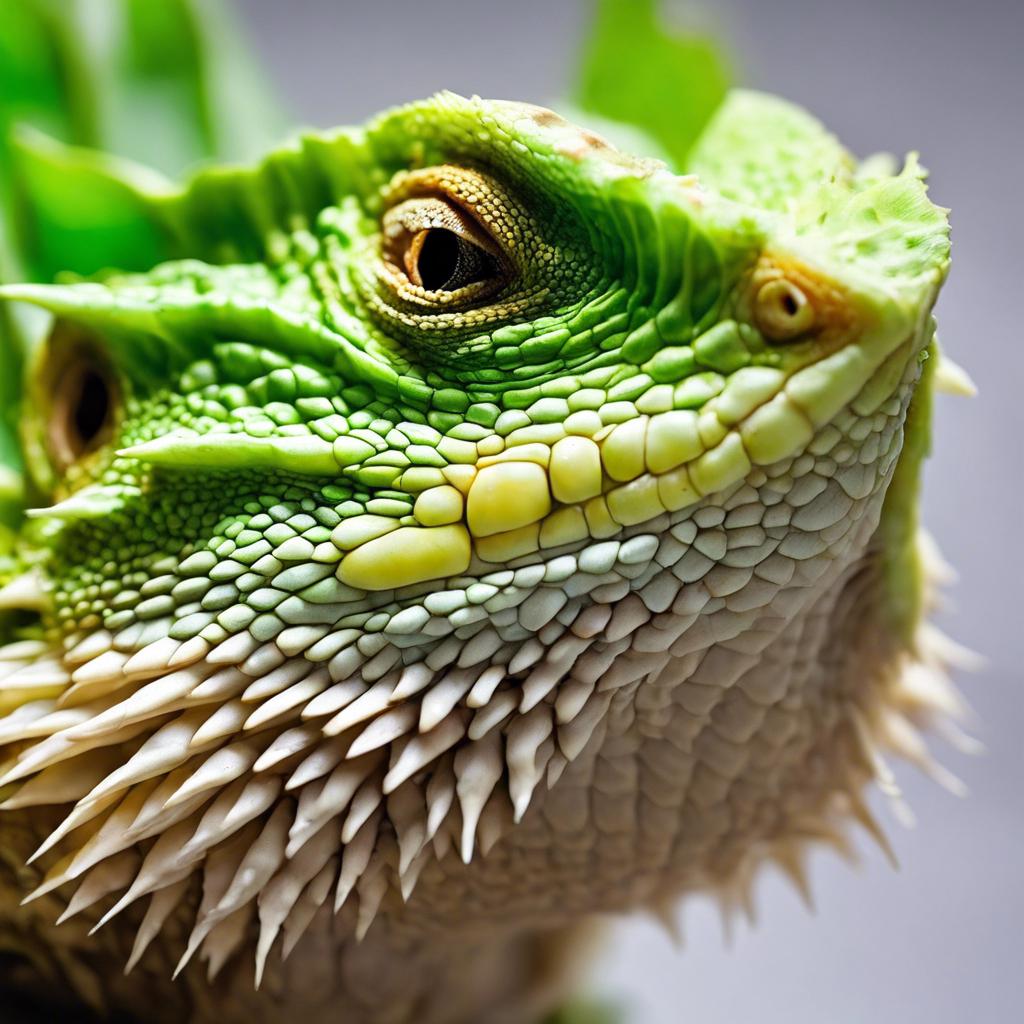A balanced diet is crucial for the overall health and well-being of bearded dragons. These reptiles require a variety of foods to meet their nutritional needs and to thrive. In this article, we will focus on the role of romaine lettuce in a bearded dragon's diet. Romaine lettuce is a popular choice among bearded dragon owners due to its availability and high water content. However, it is important to understand the nutritional value of romaine lettuce and how it fits into a balanced diet for these reptiles.
Key Takeaways
- Bearded dragons require a balanced diet to maintain good health.
- Romaine lettuce can be a nutritious addition to a bearded dragon's diet.
- However, feeding too much romaine lettuce can cause digestive issues and health risks.
- It is important to follow dos and don'ts when feeding romaine lettuce to bearded dragons.
- There are alternative greens and vegetables that can be included in a bearded dragon's diet to ensure proper nutrition.
Bearded Dragon Care: Setting the Right Diet Plan
Bearded dragons are omnivores, meaning they eat both plant matter and insects. Their diet should consist of a variety of foods to ensure they receive all the necessary nutrients. In addition to insects such as crickets and mealworms, bearded dragons should also be fed a variety of greens, vegetables, and fruits. This variety helps provide them with essential vitamins and minerals.
Calcium and vitamin supplements are also important for bearded dragons. Calcium is necessary for proper bone growth and development, while vitamins help support their overall health. These supplements can be dusted onto their food or provided in the form of liquid drops.
Nutritional Value of Romaine Lettuce for Bearded Dragons
Romaine lettuce is a leafy green vegetable that is low in calories and high in water content. It is also a good source of fiber, which aids in digestion. Romaine lettuce contains several important vitamins and minerals, including vitamin A, vitamin K, folate, and potassium.
When compared to other greens commonly fed to bearded dragons, romaine lettuce falls somewhere in the middle in terms of nutritional value. While it does not have as high levels of certain nutrients as other greens like kale or collard greens, it still provides a good amount of vitamins and minerals.
Can Bearded Dragons Eat Romaine Lettuce? Yes or No?
Yes, bearded dragons can eat romaine lettuce. Romaine lettuce is safe for bearded dragons to consume in moderation. It is a good source of hydration due to its high water content, and it provides some essential vitamins and minerals. However, it should not be the sole component of their diet, as it does not provide all the necessary nutrients that bearded dragons need.
Bearded Dragon Digestion: How Romaine Lettuce Affects Them
Bearded dragons have a unique digestive system that allows them to efficiently break down and absorb nutrients from their food. They have a relatively short digestive tract, which means they require foods that are easily digestible.
Romaine lettuce is a leafy green vegetable that is relatively easy for bearded dragons to digest. Its high water content helps keep them hydrated, and the fiber aids in digestion. However, it is important to note that too much romaine lettuce can lead to loose stools or diarrhea in bearded dragons.
Feeding Romaine Lettuce to Bearded Dragons: Dos and Don'ts

When feeding romaine lettuce to bearded dragons, there are a few important things to keep in mind. First, it is crucial to wash the lettuce thoroughly before feeding it to your pet. This helps remove any pesticides or bacteria that may be present on the leaves.
Second, it is important to feed romaine lettuce in moderation. While it can be a healthy addition to their diet, it should not make up the majority of their food intake. Bearded dragons require a variety of foods to meet their nutritional needs, so it is important to offer a balanced diet.
Health Issues: Risks Associated with Feeding Romaine Lettuce
Feeding too much romaine lettuce to bearded dragons can lead to health issues. As mentioned earlier, excessive consumption of romaine lettuce can cause loose stools or diarrhea in these reptiles. This can lead to dehydration and other complications if not addressed.
Additionally, romaine lettuce is low in certain nutrients that bearded dragons need, such as calcium. If bearded dragons are fed too much romaine lettuce and not enough calcium-rich foods, they may develop metabolic bone disease, which can lead to weak bones and other health problems.
Alternatives to Romaine Lettuce for Bearded Dragons
While romaine lettuce can be a healthy addition to a bearded dragon's diet, there are also other greens that can be fed to provide a wider range of nutrients. Some alternatives to romaine lettuce include kale, collard greens, mustard greens, and dandelion greens.
Kale is a nutrient-dense green that is high in calcium and vitamin A. Collard greens are also rich in calcium and provide a good amount of fiber. Mustard greens are high in vitamin K and folate, while dandelion greens are a good source of vitamin C.
Bearded Dragon Care: Balancing the Diet
Balancing the different types of food in a bearded dragon's diet is crucial for their overall health. While romaine lettuce can be included as part of their diet, it should not be the sole component. It is important to offer a variety of greens, vegetables, fruits, and insects to ensure they receive all the necessary nutrients.
Variety is key when it comes to feeding bearded dragons. By offering a wide range of foods, you can help prevent nutritional deficiencies and keep their diet interesting. It is also important to feed in moderation and avoid overfeeding any one type of food.
Maintaining a Healthy Diet for Bearded Dragons
In conclusion, a balanced diet is essential for the health and well-being of bearded dragons. Romaine lettuce can be a healthy addition to their diet, as it provides hydration and some essential vitamins and minerals. However, it should not make up the majority of their food intake, and it should be fed in moderation.
It is important to offer a variety of foods to ensure bearded dragons receive all the necessary nutrients. Calcium and vitamin supplements are also important for their overall health. By maintaining a balanced diet and providing a variety of foods, you can help ensure that your bearded dragon stays healthy and happy.
If you're wondering whether bearded dragons can eat romaine lettuce, you might also be interested in finding out what other foods are safe for them to consume. Reptile Wizard has a helpful article that explores the dietary options for bearded dragons, including whether they can eat black beans and black olives. To learn more about these intriguing reptiles and their nutritional needs, check out the article “Can Bearded Dragons Eat Black Beans?” and “Can Bearded Dragons Eat Black Olives?”. For additional reptile-related insights and tips, don't forget to explore their blog section as well: Reptile Wizard Blog.
FAQs
What is a bearded dragon?
A bearded dragon is a type of lizard that is commonly kept as a pet. They are native to Australia and are known for their distinctive spiny “beard” under their chin.
Can bearded dragons eat romaine lettuce?
Yes, bearded dragons can eat romaine lettuce in moderation. However, it should not be the main part of their diet as it is low in nutritional value.
What should bearded dragons eat?
Bearded dragons should primarily eat a diet of insects, such as crickets and mealworms, as well as leafy greens and vegetables. They also require a source of calcium, such as calcium powder or calcium-rich foods like kale.
What foods should be avoided when feeding bearded dragons?
Bearded dragons should not be fed foods that are high in oxalates, such as spinach and beet greens, as they can bind to calcium and prevent its absorption. They should also not be fed foods that are high in phosphorus, such as rhubarb and broccoli, as it can interfere with calcium absorption.
How often should bearded dragons be fed?
Bearded dragons should be fed daily, with a variety of insects and vegetables. The amount and frequency of feeding will depend on the age and size of the bearded dragon. Younger dragons will require more frequent feedings than adults.

